On the present and the future of land freight transport dispute-resolution
DOI:
https://doi.org/10.36151/SYBIL.2024.003Keywords:
Land (road and rail) freight transport disputes, Europe-China rail corridors, Convention on the Contract for the International Carriage of Goods by Road (CMR), Uniform Rules concerning the Contract of International Carriage of Goods by Rail (CIM Rules), CIM/SMGS Consignment Note, Alternative Dispute Resolution (ADR) mechanismsAbstract
The resolution of land freight transport disputes along Europe-China corridors and along the regional routes that link China to other Asian countries poses legal challenges to the existing lex mercatoria in this field. The CMR is the unrivalled convention on the road freight transport contract and the adhesion of China and other Asian countries to it is the most reasonable way of bringing legal certainty to the resolution of these relatively new road freight transport disputes. The cross-border legal regime of rail freight is geographically fragmented (between the CIM Rules and SMGS) and the universalization of these regimes seems unfeasible in the short term. In the long term, a new overarching convention on the rail freight transport contract could resolve the challenges derived from fragmentation. So far, when neither the CIM Rules nor SMGS can be applied proprio vigore, the resolution of disputes relies upon a series of contractual legal instruments designed by rail freight industry associations. When it comes to third-party adjudication, international treaties favor litigation before State courts through private international law mechanisms on lis pendens and on the recognition and enforcement of court rulings. Meanwhile, the aforementioned contractual legal instruments often favor the utilization of ADR mechanisms.
Published
Issue
Section
License
Copyright (c) 2024 Spanish Yearbook of International Law

This work is licensed under a Creative Commons Attribution-NonCommercial-NoDerivatives 4.0 International License.




